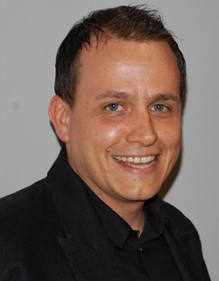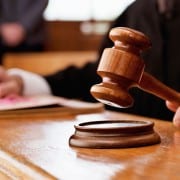|
Getting your Trinity Audio player ready...
|
 By Lee-Ann Alfreds
By Lee-Ann Alfreds
He is prepared to face the consequences of his actions – which include being jailed – as he genuinely believed he had no other choice.
These were the sentiments of arms deal critic Hennie van Vuuren, after he refused to testify at the Arms Procurement Commission.
Explaining his decision, which sent shockwaves through the commission on Monday 20 October, Van Vuuren explained that he had thought long and hard about whether to testify and indicated that it had been an “extremely difficult decision”.
“It wasn’t one that was made in a rush. It was thought through very carefully. (But) there was no other way. It we’re committed to stopping corruption in SA, our institutions have to be seen to be working. When they fail us, it’s our responsibility to challenge these institutions," he told Corruption Watch last week.
"It’s clear that the Arms Procurement Commission was, and is, failing the South African people and the only way for me to honestly participate in that process was to make it clear that I am not going to give legitimacy to a process that is extremely flawed.”
The commission is probing allegations of fraud and corruption in South Africa’s controversial multi-billion rand purchase of arms in 1999. Van Vuuren and fellow critics Andrew Feinstein and Paul Holden were subpoenaed after they announced in August that they were withdrawing from the process because they were being treated unfairly. They said they would not have been able to rely on documents they had not written, had not been given access to documents that they had requested and that key documents – that showed evidence of impropriety, bribery and corruption – had been admitted into evidence.
Van Vuuren stands the chance of being jailed or fined after the commission indicated on Monday it will take legal against him.
“The law is there. It will have to take its course. We will decide in due course on the sort of action we are going to take,” said commission chairman Judge Willie Seriti. “We are going to try and put into motion processes of the law to deal with your client’s refusal, despite having been properly subpoenaed to testify before this commission.”
Action to be taken against critics
Commission spokesman William Baloyi told Corruption Watch on Friday that it was “a criminal offence for a duly subpoenaed witness to refuse to testify and a prison term with an option of a fine may be imposed upon conviction”.
But he said the decision would be taken later as the commission is “presently busy working on the programme for the next set of witnesses”.
Responding to the prospect that he could be jailed, Van Vuuren said simply: “I’m prepared to face whatever the consequences are.”
Van Vuuren acknowledged the performance of critics – especially activist Terry Crawford-Browne whose appeal to the Constitutional Court led President Jacob Zuma to institute the commission three years ago – at the inquiry had not advanced the case of those who believed the arms deal was riddled with corruption and fraud.
He admitted Crawford-Browne had “gone on a tangent and focused on gossip” instead of the “evidence”. In widely-ridiculed testimony, Crawford-Browne testified there were allegations that when former Communist Party leader Chris Hani was assassinated by Janusz Waluś in 1993, he was on the verge of exposing Defence Minister Joe Modise’s involvement in, and corruption relating to, the arms deal.
“It has been alleged that (killer) Janusz Waluś was ultimately employed by the [British arms manufacturer] BAE, perhaps by way of John Bredenkamp, the Rhodesian/Zimbabwean who was the second-largest recipient of those BAE bribes,” Crawfod-Browne told the inquiry.
But while acknowledging that Crawford-Browne made a “huge error that he hasn’t recognised”, Van Vuuren pointed out that the critics of the arms deal were “not on trial” and that the commission was supposed to be “about arriving at the truth” behind the deal which is believed to have cost South Africa R71-billion. He said instead of treating the critics hostilely, the commission should have been focused on interrogating the arms companies, President Thabo Mbeki, cabinet ministers and others involved in the deal.
Commission not doing what it should
This had “sadly been a struggle” for the commission.
“Rather than focus on individuals, the real responsibility lies with the commission. That’s where the real story lies,” Van Vuuren said. “I do think that the way the commission has come up with an extraordinary manner in an attempt to discredit us … is deeply regrettable.”
He also pointed out that commission spokesman William Baloyi’s contentions that Van Vuuren, Holden and Feinstein were using the commission to run a parallel investigation was “utterly false” and “spin that has little meaning”.
“There is no benefit to us in doing so. It’s not as if somebody’s funding us to be in front of the commission. We are doing this completely voluntarily.”
Van Vuuren also pointed out that when the trio was initially subpoenaed a few years ago, they had been promised that they would have access to all the documents they needed, which had not transpired. He said the way the commission was being run had served to “validate the inherent unfairness” in which critics had been treated as opposed to state witnesses.
Acting with integrity
Meanwhile, Feinstein has confirmed that he was served with his subpoena last week and that they had informed the commission that he “would not be there”.
“I don't want the taxpayer to fund my flying to SA to tell the commission in person what we've told them in writing, which is that we will not participate,” he told Corruption Watch.
Feinstein said his reasons for refusing to attend were “more than valid”.
“If they prosecute any of us (jurisdiction being unclear in relation to Paul and I) we will utilise the opportunity to expand upon our deep concerns with the conduct of the commission.”
Holden revealed he had not been served yet, but indicated the commission would struggle to enforce any penalties for refusing to attend as the “APC does not have extra-territorial powers”.
But he said he supported Van Vuuren’s refusal to testify. “We are emboldened by the fact that we are striving to act with integrity and both in and with the support of civil society. It is entirely possible that the commission may seek to prosecute us, or more likely just Hennie as he is in their jurisdiction. I believe that, if it does, we will be able to amply defend our decisions.”
Baloyi confirmed that subpoenas could “not be enforced outside our jurisdiction”. But he added, “It seems that our only option is to wait for them (Holden and Feinstein) to return to South Africa if time permits.”






